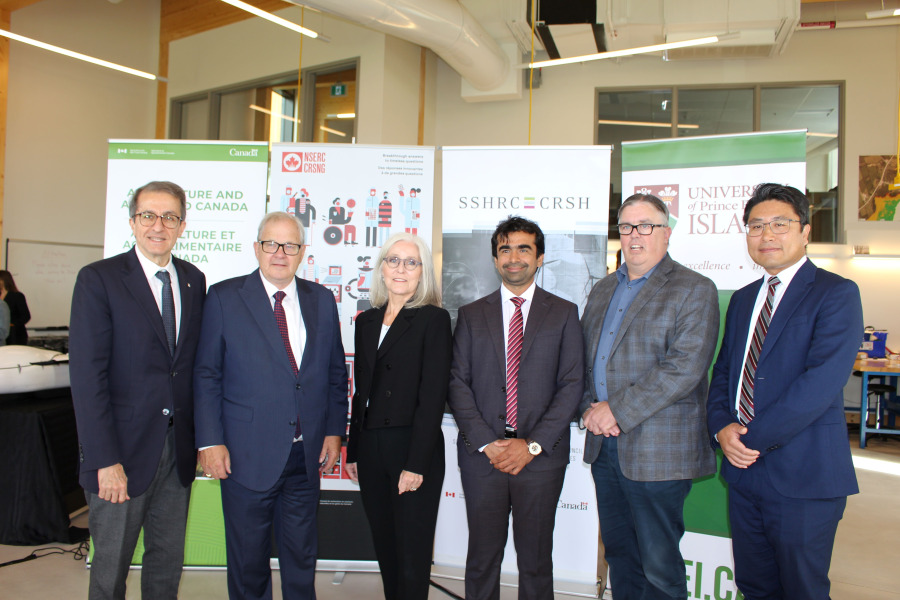UPEI leads $6.93 million precision agriculture research project to mitigate climate change

A team of researchers from across Canada, led by Dr. Aitazaz Farooque, professor and interim associate dean of the UPEI School of Climate Change and Adaptation, has received $6.93 million in federal funding to develop precision agriculture techniques to ensure food security and mitigate climate change.
The Honourable Lawrence MacAulay, Minister of Agriculture and Agri-Food, and the Honourable François-Philippe Champagne, Minister of Innovation, Science and Industry, announced an investment of $87.5 million over four years to support 16 Canadian research projects, including the UPEI-led project, to accelerate the development of solutions to support a sustainable agriculture and agri-food sector in a net-zero economy. Minister MacAulay and Professor Alejandro Adem, president of the Natural Sciences and Engineering Research Council of Canada (NSERC), announced the funding on August 29 at the UPEI Canadian Centre for Climate Change and Adaptation in St. Peter’s Bay, PEI.
“As we continue to tackle climate change, it’s vitally important that we support our farmers and work to maintain a resilient food system for future generations,” said Minister MacAulay. “Our investment in these projects reiterates our commitment to keep our agriculture sector on the cutting edge.”
The research teams and projects are supported by grants awarded through the NSERC-SSHRC Sustainable Agriculture Research Initiative (SARI), a joint initiative between the Natural Sciences and Engineering Research Council of Canada (NSERC) and the Social Sciences and Humanities Research Council (SSHRC), in collaboration with Agriculture and Agri-Food Canada (AAFC).
“We are grateful to the Government of Canada, NSERC, and SSHRC for their investments in this vital research across the country,” said UPEI President and Vice-Chancellor Wendy Rodgers. “The collaborations supporting the Canadian Centre for Climate Change and Adaptation at UPEI demonstrate the profound benefits of working together for greater impact. UPEI is proud to support researchers working on exciting and innovative adaptations to climate change. We are especially proud of Dr. Aitazaz Farooque and his team’s work on precision agriculture, which is yielding sustainable practices with minimal environmental impact and inspiring the next generation of sustainability scholars.”
“I am incredibly delighted and honoured to be one of the recipients of the sustainable agriculture research initiative,” said Dr. Farooque. “This is a great accomplishment for my team and me, the CCCCA, and UPEI.”
Canada’s agriculture sector is vital for food security and contributes $143 billion to the gross domestic product, he said. However, farmers face significant uncertainties due to climate change, declining soil health, and current economic conditions. Agriculture generates approximately 10 per cent of Canada’s greenhouse gas (GHG) emissions, and reducing these emissions is crucial to mitigate climate change and achieve our net zero commitments.
The project will advance the use of in-field best management practices to improve soil health, lower GHG emissions, enhance carbon sequestration, and develop innovative precision agriculture systems, technologies, and practices to increase farm profitability and lower environmental risks by implementing climate-smart agriculture practices. Highly qualified personnel and growers will receive hands-on training in sustainable agriculture best management practices through scientific design and investigation in the lab and field.
Working on the project will be a team of Indigenous researchers and precision agriculture experts, including soil scientists, engineers, modelers, social scientists, data scientists, agronomists, and economists. Also involved are agriculture industry partners, collaborators at other Canadian and international universities, and the governments of the four Atlantic Canadian provinces.
“This research will advance the adoption of sustainable agriculture best management practices and bridge modern science with Indigenous knowledge to strengthen rural life in Canada with environmental, social, and economic benefits,” said Dr. Farooque. “The application of novel technologies developed through this project will make Canada a world leader in sustainable agriculture, which will ultimately help to achieve net zero targets.”
UPEI acknowledges the assistance of Canada’s tri-council of federal granting agencies—Natural Sciences and Engineering Research Council of Canada (NSERC), the Social Sciences and Humanities Research Council (SSHRC), and the Canadian Institutes of Health Research (CIHR)—through its Research Support Fund, which helps fund services and infrastructure that support research activities at the University. In 2024–2025, UPEI’s RSF allocation is $1,041,691.